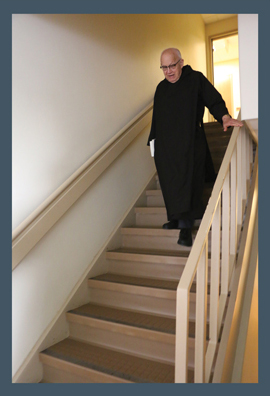
Listen Readily to Holy Reading
After Compline Fr. Xavier bounds across the walkway that connects the monastery to St. Stephen’s Infirmary. With eyes down and clutching a book in his hand, he walks with purpose as if he were sent on mission. He makes his way down the stairs, carefully holding the handrail with his free hand as he descends, and then he makes his rounds stopping by several of the resident’s rooms— his “regulars” as he describes them—and he inquires, “Are you ready for reading?” One by one, the monks walk (or roll) to the infirmary’s common room, sometimes called the calefactory (yes, it does actually have a fireplace which perfects the ambiance in the winter months). Fr. Xavier takes his seat in a large wooden chair draped with a quilt as he waits for the others to gather in attendance. Once everyone is in place, with full voice he announces from a daily reflection book a brief saying of St. Teresa of Calcutta, then he opens the book for the main event. It’s story time.

Reading isn’t anything new to monastic life or to the more seasoned brethren residing in the Infirmary. In his Holy Rule, St. Benedict instructed his monks to “Listen readily to holy reading” and even gave specific hours when the monks should devote themselves to “prayerful reading” (cf. RB 4:55; 48:1-4). Reading aids the spiritual life of the monk and is intended to nourish the soul in a way similar to how food nourishes the body, thus reading is a fitting practice that accompanies meals in the monastic refectory.
Fr. Xavier’s original motivation to begin nightly reading in the infirmary was to support his confreres there, especially Fr. Samuel with whom he worked in the seminary for many years. Fr. Xavier appreciates most the reactions and facial expressions of his brothers and conversation the reading evokes. He sees reading aloud as providing a sense of fraternity and human contact that cannot be conveyed through merely playing an audiobook.
If we learned anything over the past year, we know how human persons thrive in community and isolation can be a heavy burden to bear. Those suffering from infirmity or old age run the greatest risk of isolation, which is one reason why Fr. Xavier sought to reach out in this small way. It’s just one example of the many ways a monastic community tries to support one another in a way that St. Benedict instructs: “They should each try to be the first to show respect to the other, supporting with the greatest patience one another’s weaknesses of body or behavior” (RB 72:3-5).
— Fr. Paul Sheller, OSB
Posted in General, Monastery News
